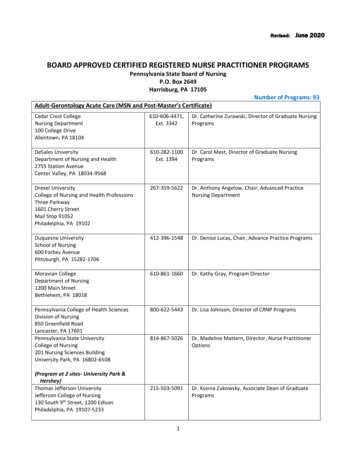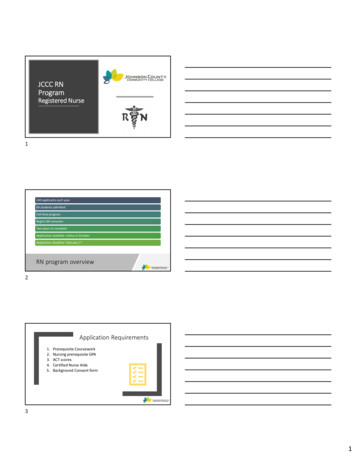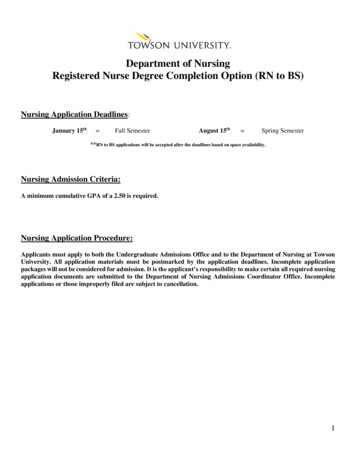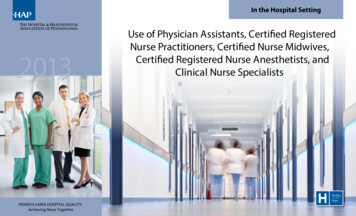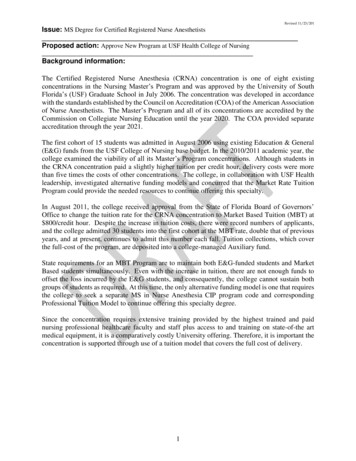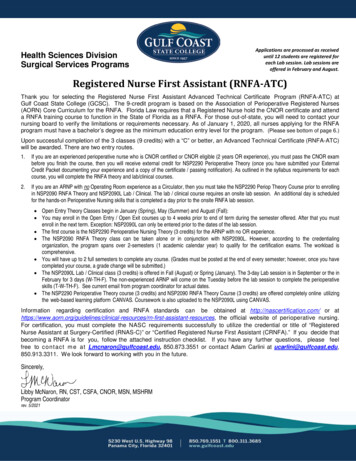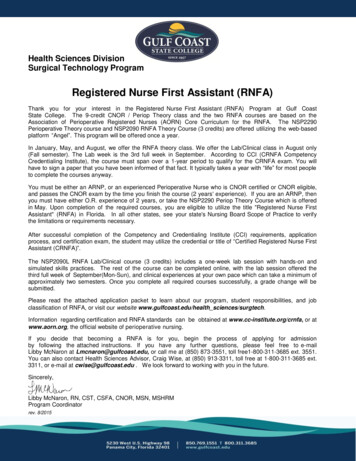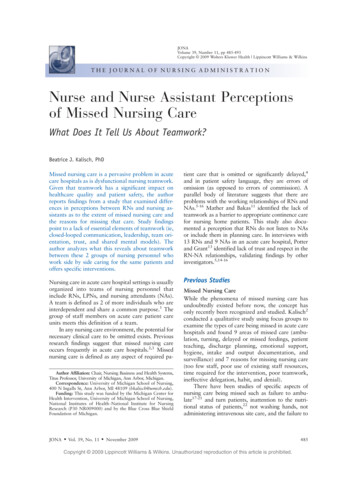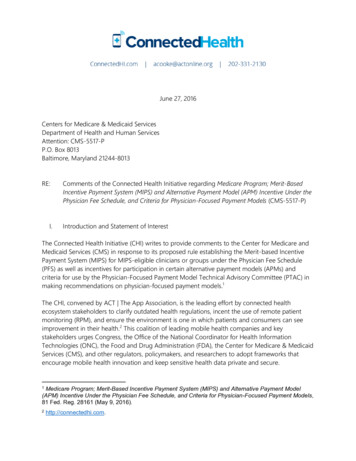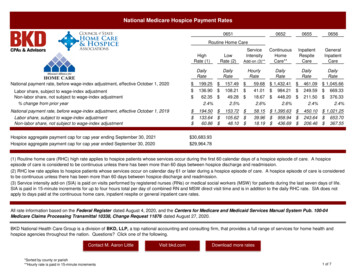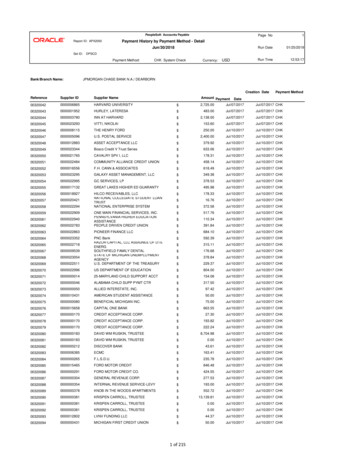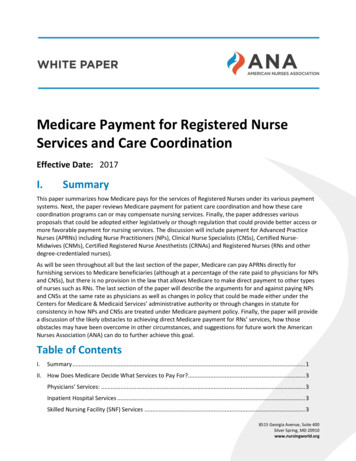
Transcription
Medicare Payment for Registered NurseServices and Care CoordinationEffective Date: 2017I.SummaryThis paper summarizes how Medicare pays for the services of Registered Nurses under its various paymentsystems. Next, the paper reviews Medicare payment for patient care coordination and how these carecoordination programs can or may compensate nursing services. Finally, the paper addresses variousproposals that could be adopted either legislatively or though regulation that could provide better access ormore favorable payment for nursing services. The discussion will include payment for Advanced PracticeNurses (APRNs) including Nurse Practitioners (NPs), Clinical Nurse Specialists (CNSs), Certified NurseMidwives (CNMs), Certified Registered Nurse Anesthetists (CRNAs) and Registered Nurses (RNs and otherdegree-credentialed nurses).As will be seen throughout all but the last section of the paper, Medicare can pay APRNs directly forfurnishing services to Medicare beneficiaries (although at a percentage of the rate paid to physicians for NPsand CNSs), but there is no provision in the law that allows Medicare to make direct payment to other typesof nurses such as RNs. The last section of the paper will describe the arguments for and against paying NPsand CNSs at the same rate as physicians as well as changes in policy that could be made either under theCenters for Medicare & Medicaid Services’ administrative authority or through changes in statute forconsistency in how NPs and CNSs are treated under Medicare payment policy. Finally, the paper will providea discussion of the likely obstacles to achieving direct Medicare payment for RNs’ services, how thoseobstacles may have been overcome in other circumstances, and suggestions for future work the AmericanNurses Association (ANA) can do to further achieve this goal.Table of ContentsI.Summary . 1II. How Does Medicare Decide What Services to Pay For?. 3Physicians’ Services: . 3Inpatient Hospital Services . 3Skilled Nursing Facility (SNF) Services . 38515 Georgia Avenue, Suite 400Silver Spring, MD 20910www.nursingworld.org
Home Health Services . 4Certified Nurse-Midwife (CNM) Services. 5Certified Registered Nurse Anesthetist (CRNA) Services. 5Rural Health Clinic (RHC) Services and Federally Qualified Health Center (FQHC) Services . 5“Incident to” Services . 5III. How Does Medicare Decide How to Pay for Services in the Different Benefit Categories? . 7Inpatient Hospital Services . 8SNF Services . 8Home Health Services . 8NP, CNS, and CNM Services . 8CRNAs . 8RHC and FQHC Services . 9“Incident to” Services . 9IV. Medicare Care Coordination Initiatives: . 9Care Coordination Provisions of the Current Fee-For-Service Program in Place Nationally . 9Transitional Care Management (TCM) . 9Chronic Care Management (CCM) . 10Psychiatric Collaborative Care Model (CoCM). 10General Behavioral Health Integration (BHI) . 11Assessment and Care Planning for Patients with Cognitive Impairment: . 11Accountable Care Organizations (ACO) . 12Care Coordination Models Under Study by the Center for Medicare and Medicaid Innovation:. 12Comprehensive Primary Care Initiative (CPCI) . 12Comprehensive Primary Care (CPC) . 13Oncology Care Model (OCM) . 14Bundled Payment for Care Initiative (BPCI) . 14Comprehensive Care for Joint Replacement (CJR) and Episode Payment Models (EPM) . 15V. Statutory or Regulatory Changes to Facilitate Access to Nursing Services . 16Make Payment to NPs and CNSs at the Same Rate as Physicians . 16Change the Statute to Allow Direct Payment to Registered Nurses (RN) . 20VI. Conclusions and Recommendations. 23Page 2Medicare Payment for Registered Nurse Services and Care Coordination8515 Georgia Avenue, Suite 400Silver Spring, MD 20910www.nursingworld.org
II.How Does Medicare Decide What Services to PayFor?Medicare Part A provides benefits for inpatient hospital care, skilled nursing facility care, home health, andhospice. Medicare Part B provides benefits for physician and other practitioner services, diagnostic services,outpatient hospital services, durable medical equipment, and ambulance services, among others. MedicareParts A and B are known as original Medicare and generally pay using a fee-for-service model. Medicarebeneficiaries can opt to receive their Medicare benefits through Medicare Part C, which means they haveelected to have their Medicare Parts A and B benefits furnished through a private insurer. A private insurermay use fee-for-service or capitation as its model for paying for Part A and Part B services on behalf of itsenrolled beneficiaries.Within Parts A and B of Medicare are “benefit categories” that allow Medicare to make payment for specificservices. Medicare is a defined benefit category program. This means that Medicare can pay for any servicethat is described by a benefit category in Title XVIII of the Social Security Act (the Act). For example,“physicians’ services” is a benefit category that allows Medicare to pay for the services of physicians. As willbe explained in more detail below, there are also specific benefit categories for APRNs that allow APRNs toreceive direct payment from Medicare. Other than the specific APRNs with a distinct benefit category, thereis no benefit category that allows Medicare to pay other nurses directly for the services they provide.Nursing services will usually be encompassed by a more broadly described benefit category that allowsMedicare to compensate the nurse’s employer for the nursing services being provided. Some commonbenefit categories under which Medicare will pay for nursing services are described below.Physicians’ Services: Section 1861(s)(1) of the Act is the benefit category for physicians’ services. The statutedefines physicians’ services as “professional services performed by physicians ,” which means anything aphysician does that meets the criteria for Medicare coverage—meaning, is “reasonable and necessary” forthe treatment of illness or injury—is a physician’s service. As is described in more detail below, Medicare willpay for the services of nurses working for the physician under the “‘incident to a physician’s service” benefitcategory.Inpatient Hospital Services: Section 1861(b) of the Act defines “inpatient hospital services” as including“such nursing services and other related services, such use of hospital facilities, and such medical socialservices as are ordinarily furnished by the hospital for the care and treatment of inpatients .” This languageis part of a larger definition that includes bed and board among other services. As is common in thedescription of a benefit category, the statute indicates that Medicare’s payment for inpatient hospitalservices includes a broad range of services that are typically provided by hospitals. In the case of inpatienthospital services, Medicare’s payment will be made directly to the hospital because it is the hospital that isincurring the costs for the set of services described by the “inpatient hospital services” benefit category.Section 1861(b) of the Act explicitly excludes some practitioner services that have their own benefitcategories from the definition of inpatient hospital services—specifically the services of physicians, APRNs(NPs, CNSs, CNMs and CRNAs), and qualified psychologists. These practitioner services can be independentlybilled to Medicare and will be paid in addition to Medicare’s inpatient hospital payment. If thesepractitioners are employed by hospitals, their services remain separately billable to Medicare althoughemployed practitioners typically reassign their billing privileges to their employer hospital that bills for theirservices.Skilled Nursing Facility (SNF) Services: Sections 1861(h) and (i) of the Act provide Medicare with theauthority to pay for SNF services (called “extended care services” in the statute). To be eligible for SNFservices, the Medicare beneficiary is required by the statute to have been treated as a hospital inpatient forat least 3 consecutive days. The law defines SNF services as “items and services furnished to an inpatient ofPage 3Medicare Payment for Registered Nurse Services and Care Coordination8515 Georgia Avenue, Suite 400Silver Spring, MD 20910www.nursingworld.org
a skilled nursing facility” including “nursing care provided by or under the supervision of a registeredprofessional nurse.” In the case of SNF services, the statute allows Medicare’s payment to the SNF to includethe service of an RN or of a nurse with a lower level of certification who is working under the supervision ofan RN. Again, this definition is a partial one and the definition of SNF services will include a broader list ofservices such as bed and board, physical and occupational therapy services, and speech–language pathologyamong other services. Payment for the comprehensive list of SNF services defined by the statute, includingthose provided by nurses, is made to the SNF itself. SNF services also do not include practitioner servicessuch as those furnished by APRNs, which can be separately billed in addition to Medicare’s payment to theSNF.Home Health Services: Section 1861(m) of the Act defines the term “home health services” as including“items and services furnished to an individual, who is under the care of a physician, by a home health agencyor by others under arrangements with such agency.” Among those services included in “home healthservices” are “part-time or intermittent nursing care provided by or under the supervision of a registeredprofessional nurse.” Again, this definition is a partial one and the definition of home health services willinclude a broader list of services such as physical and occupational therapy services and medical socialservices, among others. The home health services definition of nursing services is very similar to the hownursing services are described for the SNF benefit category, with the major difference being that the nursingservices can be “part-time or intermittent.” However, they must be furnished under the supervision of anRN. Payment will be made directly to the home health agency for all services it provides that are included inthe home health services benefit category. Practitioner services are not commonly furnished in a patient’shome although if provided, they have their own benefit category and would be paid separately by Medicareusing the home visit codes.NP and CNS Services: Section 1861(s)(2)(K)(ii) of the Act provides Medicare with authority to make paymentdirectly to NPs and CNSs. Specifically, the statute defines these services as: services which would be physicians’ services if furnished by a physician which areperformed by a nurse practitioner or clinical nurse specialist working in collaboration with a physician which the nurse practitioner or clinical nurse specialist is legallyauthorized to perform by the State in which the services are performed This benefit category is constructed such that Medicare payment can be made to NPs and CNSs directly forany service that would be covered if it were furnished by a physician. The benefit category for physicians isunlimited. Any service performed by a physician would be included in the physicians’ services benefitcategory (section 1861(s)(1)) and would be paid by Medicare, provided the service is reasonable andnecessary. Unlike benefit categories for certain other practitioners, for NP and CNS services the Medicarestatute limits payment only to the extent that the service is within the NP’s or CNS’s state scope of practice.1Section 1861(s)(2)(K)(i) provides Medicare with authority to make payment directly to physician assistants(PAs). The PA benefit category is constructed in the same way as the NP and CNS benefit category—it isunlimited and would include any service that has a benefit category that would be paid for by Medicare if itwere done by a physician.One important distinction among PAs, NPs, and CNSs in the Medicare statute is that the Medicare benefitcategory requires the NP or CNS to be working “in collaboration” with a physician as a condition of paymentrather than “under the supervision of a physician,” which is required for PAs. “Collaboration” is a lessrestrictive standard than “supervision.”2 Unlike NPs and CNSs who may be completely in independent1For example, the Medicare statute limits the services of Clinical Social Workers (CSW) to the “diagnosis and treatment of mentalillnesses,” which precludes Medicare from paying CSWs for any services that do not have a psychiatric basis of origin. The statutefurther precludes direct payment to a CSW for services provided to inpatients of hospitals and SNFs. Compensation for CSW servicesfor hospital and SNF inpatients is made directly to the hospital or SNF.2Supervision is “direct,” “general,” or “personal.” “Direct supervision” means that the physician or other practitioner must bePage 4Medicare Payment for Registered Nurse Services and Care Coordination8515 Georgia Avenue, Suite 400Silver Spring, MD 20910www.nursingworld.org
practice and enrolled in Medicare, the PA supervision requirement precludes PAs from being enrolled inMedicare with 100% ownership of their own practices. The statute and regulations further prescribe theeducational and other qualifications that an NP and CNS must meet in order to bill Medicare directly forfurnishing services.Certified Nurse-Midwife (CNM) Services: Section 1861(s)(2)(L) of the Act furnishes the authority forMedicare to pay for CNM services. Like NP and CNS services, the CNM service benefit category allowsMedicare to pay for any CNM services within the CNM’s state scope of practice that would otherwise becovered if furnished by a physician.Certified Registered Nurse Anesthetist (CRNA) Services: Section 1861(s)(11) of the Act furnishes theauthority to pay for CRNA services. The CRNA benefit category allows Medicare to pay for “anesthesiaservices and related care” rather than “services which would be physicians’ services if furnished by aphysician.” Because the statutory language for the CRNA benefit category is different from that for NPs,CNSs, and CNMs, a question arose in 2012 as to the meaning of “anesthesia services and related care” andwhether Medicare can make payment only for CRNA services related to surgical anesthesia. The Medicareprogram is administered by Medicare Administrative Contractors (MAC) who process claims and makedecisions locally about whether to cover and pay for individual services. The decision to clarify the meaningof “anesthesia services and related care” was initiated because a MAC medical director decided thatMedicare is prohibited by statute from paying for CRNA interventional pain management services unrelatedto surgical anesthesia.In the calendar year 2013 physician fee schedule final rule, CMS indicated that “[a]nesthesia and relatedcare means those services that a certified registered nurse anesthetist is legally authorized to perform in thestate in which the services are furnished.”3 This statement would appear to make the CRNA benefit categoryas expansive as the NP, CNS, and CNM benefit categories. At this time, we are unaware of any MAC makingdecisions to limit the CRNA benefit category to specific services. It is possible that a MAC could potentiallymake a local coverage determination that limits services a CRNA could do and be paid by Medicare. To dothat, the MAC would have to justify specifically why it is not reasonable and necessary for a CRNA to providea particular service that is covered when it is done by a physician, provided the service is within the CRNA’sstate scope of practice.Rural Health Clinic (RHC) Services and Federally Qualified Health Center (FQHC) Services: Section1861(s)(2)(E) of the Act authorizes Medicare to pay for RHC and FQHC services. RHCs and FQHCs have aspecial designation under the Medicare statute and meet specific criteria. Among other benefit categories,the RHC and FQHC benefit category is composed of physicians’ services, “incident to” services (describedbelow), and the benefit categories for PAs and NPs (not CNSs), clinical psychologists, and clinical socialworkers. FQHCs are also paid for specific preventive and screening services. Practitioner services are paiddirectly to the RHC or FQHC.“Incident to” Services: The “incident to” services benefit category is a very complex provision of theMedicare statute that allows Medicare to pay for a wide variety of different services, including nursingimmediately available (although not in the room or within any physical boundary of the property) to furnish assistance and directionthroughout the performance of the procedure. “General supervision” means the procedure or service is furnished under thephysician’s overall direction and control, but the physician’s presence is not required during the performance
Medicare is a defined benefit category program. This means that Medicare can pay for any service that is described by a benefit category in Title XVIII of the Social Security Act (the Act). For example, physicians services _ is a benefit category that allows Medicare to pay for the services of physicians.

